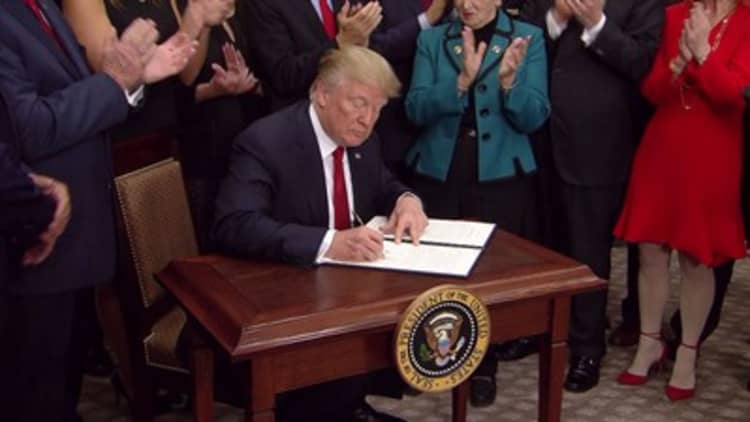
The proposed Republican tax reform bill will include repeal of Obamacare's individual mandate requiring most Americans to have some form of health insurance or pay a tax penalty, GOP leaders said Tuesday.
The decision means that Republicans, yet again in 2017, will attempt to gut a key element of the Affordable Care Act.
So far, such efforts have failed because not enough Republican senators have backed the idea of repealing the mandate, which would lead to an estimated 13 million more people lacking health insurance.
"We're optimistic that inserting individual mandate repeal would be helpful," said Senate Majority Leader Mitch McConnell, R-Ky. on Tuesday afternoon after a lunch meeting with the Republican conference.
Sen. Tom Cotton, R-Ark., said, "I'm pleased the Senate Finance Committee has accepted my proposal to repeal the Obamacare individual mandate in the tax legislation."
"Repealing the mandate pays for more tax cuts for working families and protects them from being fined by the IRS for not being able to afford insurance that Obamacare made unaffordable in the first place," Cotton said. "I urge the House to include the mandate repeal in their tax legislation."
Senate Majority Whip John Cornyn, R-Tex., said, "We're going to repeal the tax on poor Americans."
Cornyn said the majority of people who pay the individual mandate tax penalty for not having insurance have lower incomes.
Sen. John Thune, R-SD, told the Washington Post that there are 50 Republican senators willing to support the mandate-repealing tax reform bill. That would be enough to pass it, with a tie-breaking vote from Vice President Mike Pence.
Thune also said the deal agreed upon is to pass that bill alongside another bill, known as Alexander-Murray, which would restore key federal subsidy reimbursements to Obamacare insurers cut off last month by President Donald Trump.
The Democratic leader in the Senate, Chuck Schumer of New York, was scornful of the Republican decision.
"Thelma and Louise are warming up the car," Schumer said, referring to the eponymous movie that ends with two women driving their car off a very tall cliff to their deaths.
"They're cutting taxes on the wealthy and taking health care from millions and raising premiums on millions of others all to reduce taxes on the rich," said Schumer.
"Does that sound familiar? Well, it does to us. And that's why their health care bill failed."
"It's a back-door approach to get 'Trumpcare,'" Schumer said.
The moves came a day after Trump called for the tax bill to include such a repeal.
Sen. John McCain, R-Ariz., told reporters he wants to see the entire bill before he decided on whether to support repeal of the mandate.
McCain's opposition to prior Obamacare repeal bills this year had helped doom them to defeat.
A repeal of the individual mandate could alleviate one concern held by some House Republicans about the Senate's version of the bill.
But it could also make it more difficult for the tax bill to pass because of worries by some GOP members about big drops in the number of Americans with health insurance that would result from repeal of the mandate.
The Senate bill would do away with state and local income tax deductions, which are most commonly used by federal tax filers in states that have high income tax burdens. Those states, in turn, tend to lean Democrat.
House Republicans from those states are worried they will suffer in the 2018 congressional elections if they support doing away with the deductions.
Sen. Rand Paul, R-Ky., in a series of Twitter posts, said repeal of Obamacare's individual mandate "allows an additional $300 billion+ in tax cuts." Paul said he would also introduce a tax deduction similar to the House plan.
The repeal of the individual mandate and the inclusion of a state and local tax deduction in the Senate legislation would help ease acceptance by the House, Paul said.
But killing the individual mandate would lead to an estimated 13 million fewer people with health insurance by 2027.
In turn, the government would spend almost $340 billion less on subsidies for low-income people insured through Medicaid, and on subsidies for people who buy individual health plans sold on government-run marketplaces.
Trump, in his own tweet calling for the mandate's demise on Monday, said the savings could be used to cut the top marginal income tax rate for the highest income earners to 35 percent with "all the rest going to middle income cuts."
That differs from Paul's stated motivation, which is to provide relief to middle-income taxpayers.
Republicans had called for repealing the mandate in a series of Obamacare repeal-and-replace bills they proposed since the beginning of this year.
All of those bills failed, in no small part because of concerns by several Republicans in the Senate that gains in insurance coverage for millions of Americans seen under Obamacare would be wiped out if the bills became law.
Sen. Susan Collins, R-Me., said Monday that she believes it is "a mistake" to combine repeal of the mandate with the tax bill, "because I think we'll get no Democratic votes and I'd like this to be bipartisan."
Collins, along Sens. Lisa Murkowski, R-Alaska, and McCain, had voted against a GOP-sponsored bill in July that would have repealed the mandate.
Democrats in Congress universally oppose repeal of the individual mandate. But they don't have enough votes on their own to block its repeal if all of the Republicans voted for such a move.
WATCH: Trump reportedly prepped executive order that could gut Obamacare individual mandate



